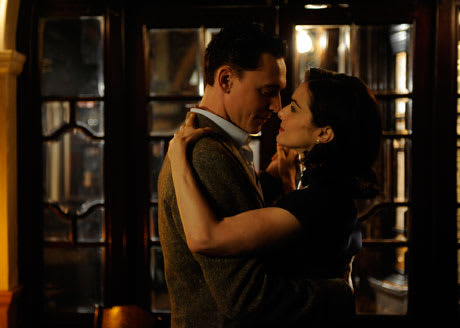Superficially speaking, Terence Davies' adaptation of the tragic Terence Rattigan play, The Deep Blue Sea, about a woman (Rachel Weisz) that leaves her successful husband (Simon Russell Beale) for an uncultured ex-soldier (Tom Hiddleston), is a work of greatness. He matches textual passion with an aesthetic and style reminiscent of the '50s London locale, using chiaroscuro lighting, lingering moments of character reflection and temporal fades and dissolves to acknowledge the cinema of the time. He also adopts a melodramatic score, capturing the grains of natural lights and smoke to transport the viewer into the look and feel of the past. This impassioned eye for nostalgia and exactitude is thematically mirrored by Hester Collyer's (Weisz) struggle with passion, having stepped away from comfort and social expectations into the unknown with an unreliable man whose spontaneity and vitality are as present as his self-involvement and mercurial sensibilities. She sacrifices safety and social propriety to experience life, only to suffer the uglier side of abandon in acknowledging the impossibility of sustainment, which is heightened by Davies' intense commitment to his time capsule perspective. But what's missing in this vision, almost ironically, is the very emotion that the story relies on thematically and narratively. Aesthetically, the intricate beauty of each shot and set-up demonstrates an obvious love and appreciation of times and cinema of the past, which is ultimately what holds it back from connective greatness. The preoccupation with looks and gimmicks actually subdue the textual recklessness and life-defining lust that propel Hester's plight, realizing that with excitement often comes danger. Perhaps the intent was to step away from emotion and take a nostalgic male look at the nature of female fantasy and desire, but in doing so, Hester's feelings are merely portraits of ideas rather than something that reaches out of the screen. Much like the many mirrors and windows in virtually every scene of the film, we're given a look at our protagonist through reflections and glances, but are never asked to identify or understand beyond what our experiences inject. Davies doesn't seem aware of this flaw when discussing his film in the interviews and commentary included with the Blu-Ray, but he is quick to point out any perceived mistake or error made by others. Also included with the Blu-Ray is a far more compelling supplement on the nature of the cinematography.
(Mongrel Media)The Deep Blue Sea [Blu-Ray]
Terence Davies

BY Robert BellPublished Aug 17, 2012